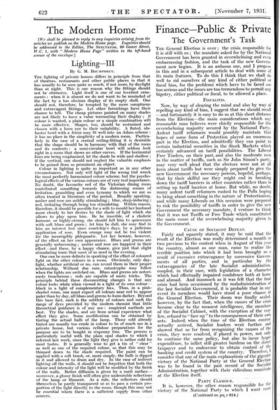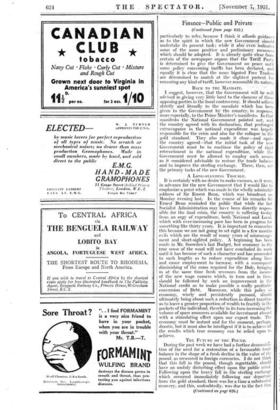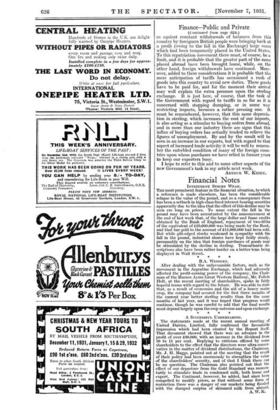Finance—Public & Private
The Government's Task
THE General Election is over ; the crisis responsible for it is still with us ; the mandate asked for by the National Government has been granted in overwhelming and even embarrassing fashion, and the task of the new Govern- ment now begins. It is an arduous one, and I propose in this and in a subsequent article to deal with some of its main features. To do this I think that we shall do well to rid ourselves of any kind of either political or fiscal bias, for the problems which have to be faced are too serious and the issues are too tremendous to permit any bigotry, either political or fiscal, to be allowed a place.
FISCALITIS.
Now, by way of clearing the mind and also by way of repelling any kind of bias, I suggest that we should recall —and fortunately it is easy to do so at this short distance from the Election—the main considerations which any reasonable man believes were chiefly responsible for the overwhelming majority secured by the National Party. Ardent tariff reformers would possibly maintain that hopes of some form of Protection played an enormous part in the Election, and admittedly they can point to certain industrial securities in the Stock Markets which certainly advanced on tariff possibilities. The Liberal Free Traders, on their part, and also the moderate men in the matter of tariffs, such as Sir John Simon's party, may very well plead that the electors were not at all keen about tariffs but were simply prepared to give the new Government the necessary powers, hopeful, perhaps, that by their skilful use they might end in breaking down the tariff barriers in other countries rather than in setting up tariff barriers at home. But while, no doubt; many ardent tariff reformers rushed to the Polls hoping to bring about something in the nature of Protectionism, and while many Liberals on this occasion were prepared to risk the possibility of tariffs in order to give the new Government the necessary mandate, I venture to think that it was not Tariffs or Free Trade which constituted the main cause of the overwhelming majority given to the Government.
CAUSE OF SOCIALIST DEFEAT.
Fairly and squarely stated, it may be said that the result of the Election was really determined a month or two previous to the contest when in August of this year the country, almost as one man, came to realize the terrible position into which it had been brought as a result of excessive extravagance by successive Govern- ments of all parties, and in particular by the extravagancies of the late Socialist administration, coupled, in their case, with legislation of a character which had effectually impaired confidence both at home and abroad. And inasmuch as it was felt that the final crisis had been occasioned by the maladministration of the last Socialist Government, it is 'probable that in any event its members would have stood a poor chance at the General Election. Their doom was finally sealed, however, by the fact that, when the causes of the crisis became clear to the meanest intelligence, the members of the Socialist Cabinet, with the exception of the very few, refused to "face up " to the consequences of their own acts. Indeed, when the time of -the Election contest actually arrived, Socialist leaders went further and showed that so- far from recognizing the 'causes of the crisis, they were resolved, if placed in power, not only to continue the same policy, but also to incur larger expenditure, to inflict still greater. .btirdens on the direct taxpayer and to endeavour to 'obtain • control . of the banking and credit system of the country: Therefore, I consider that one of the main ekplanations of the. gigantic victory of the National Party at the General Election was to be found in the past record of the Socialist Administration, together with their ridiculous manifesto at the Election itself. -
PARTY CLAMOUR.
It is, however, the other reason respoimilile for the victory of the National Party to which I want more (Cmtinued on pate 624.)
Finance—Public and Private
(Continued from page 622.) particularly to refer, because I think it affords guidance as to the spirit in which the new Government should undertake its present task; while -it-6-1S-6 eV-erf 'indicates some of the more positive and preliminary measures which should be adopted.' It is already quite clear from certain of the -newspaper organs that- the -Tariff Party is determined to give the Government no • peace until some policy concerning tariffs has been declared, and equally it is clear that the more • bigoted Free Traders are determined to snatch at the slightest pretext for censuring any kind of tariff; however reasonable its nature.
BACK TO THE MANDATE. I suggest, hoWever, that the Government will be well advised in giving very little heed to .the clamour of these opposing parties in the fiscal controversy. It should adhere strictly and literally to the mandate which has been given- to the' Government by the country; 'in response, more especially, to the Prime Minister's manifesto. In that manifesto the National - Government pointed out, and the country agreed with its declaration, that prolonged extravagance in the national expenditure was • largely responsible for the crisis and also for the collapse in the gold standard. They also made it clearand again the country agreed—that the initial task of the new Government must be to continue the policy of rigid retrenchment in the national expenditure, while the Government must be allowed to employ such means as it considered advisable to restore the trade balanee and to improve the sterling exchange. These, then, are the primary tasks of the new Government.
A LONG-STANDING TROUBLE. It is certainly with no desire to make excuses, as it were, in advance for the new Government that I would like to emphasize a point which was made in the wholly admirable address of Sir Ernest Benn, which was broadcast on Monday evening last. In the course of his remarks Sir Ernest Benn reminded the public that while the last Socialist Administration may have been directly respon- sible for the final crisis, the country is suffering to-day from an orgy of expenditure, both National and Local, which with ever-increasing pace has been in progress for something like thirty years. It is important to remember this because we are not going to set right in a few months evils which are the result of many years of mismanage- ment and short-sighted policy. A beginning has been made in Mr. Snowden's last Budget, but economy in the true sense of the word will not have concluded its work until it has become of such a character and has proceeded to such lengths as to reduce expenditure along lines and cause employment to increase, with a consequent diminishing of the sums required for the Dole, bringing in at the same time fresh revenues from the income of the new wage earners which, in turn and in time, should be followed by such an improvement in the National credit as to make possible a really profitable conversion of Debt. Moreover, while this policy of economy, wisely and persistently pursued, should ultimately bring about such a reduction in direct taxation as to leave a greater proportion of wealth to fructify in the pockets of the individual, thereby in its turn increasing the volume of spare resources available for investment abroad with a stimulating effect upon our export trade. The economy must be instant and for the moment, perhaps, drastic, but it must also be intelligent if it is to achieve all the results which true economy can be relied upon to achieve.
THE FUTURE OF THE POUND. During the past week we have had a further demonstra- tion of the need for a restoration of a favourable trade balance in the shape of a fresh decline in the value of the pound, as measured in foreign currencies. I do not think that this fall in the pound, though regrettable, should have an unduly disturbing effect upon the public mind. Following upon the heavy fall in the sterling exchange Which occurred ininiediately 'following our , departure from-the gold. standard; there -was for a time a substantial recovery, and this, undoubtedly, was due to-the fact that (Conlinned on page 626.)
Finance—Public and Private
(Continued from Page 624.)
as against constant withdrawals of balances from this country by foreigners British people were bringing back at a profit (owing to the fall in the Exchange) large sums which had been temporarily placed in the United States. To this repatriation movement there must, of course, be a limit, and it is probable that the greater part of the sums placed abroad have been brought home, while, on the other hand, foreign -withdrawals have continued. More- over, added to these considerations it is probable that the mere anticipation of tariffs has occasioned a rush of goods into this country to avoid new duties. These goods have to be paid for, and for the moment their arrival may well explain the extra pressure upon the sterling exchange. It is just here, of course, that the task of the Government with regard to tariffs in so far as it is concerned with stopping dumping, or in some way restricting imports, becomes a rather pressing one. It must be remembered, however, that this same deprecia- tion in sterling, which increases the cost of our imports, is also acting as a stimulus to buying orders from abroad, and in more than one industry there are signs that this influx of buying orders has actually tended to relieve the figures of unemployment. By and by the result will be seen in an increase in our exports, but with regard to that aspect of increased trade activity it will be well to remem- ber the enfeebled condition of many of the foreign coun- tries upon whose purchases we have relied in former years to keep our exporters busy.
I hope to refer to this and to some other aspects of the new Government's task in my article next week.
ARTHUR W. KIDDY.
















































 Previous page
Previous page